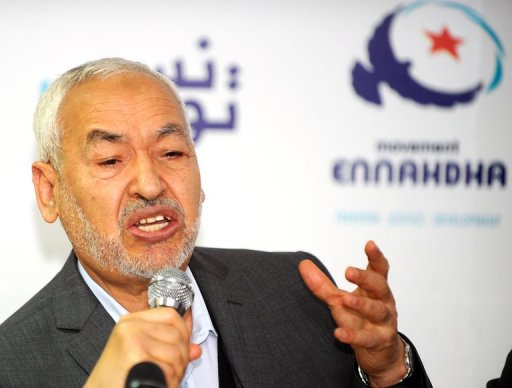As the Tunisian Ministry of the Interior announced that no demonstrations would be permitted on Friday, the Muslim leader Rached Ghanoushi warned of the dangers of violent fundamentalism. The Tunisian government invoked emergency powers on learning of plans for violent disruptions on Friday, in response to anti-Islam caricatures published in the French magazine Charlie Hebdo.
Ghanoushi, the leader of the ruling al-Nahda Party and a long-time proponent of political Islam in Tunisia, has come out strongly against the small but violent “Salafi Jihadi” movement in an interview with Agence France Presse. He said that these violent extremists posed a threat both to his own al-Nahda Party and also to general liberties in the country, and said that such disruptive groups need to be dealt with decisively.

The Salafis, or hard line ultra-fundamentalists, in Tunisia, unlike those in Egypt, did not gain seats in parliament, and they are mainly known for a series of small but provocative public acts of violence and disruption, including throwing stones outside movie theaters, rioting outside art exhibits, harassing unveiled women, attacking tourist hotels for selling alcohol, and, last Saturday, attacking the American school and setting a fire on the grounds of the US Embassy in Tunis. The hard core of activists sometimes gets support in a few working class districts of the capital and some small rural towns, but it is far out of the mainstream of the country.
Many Tunisians are secularists, and there is a strong tradition of moderate Sunni Muslim reformism. Ghanouchi himself told me in an interview in May that his al-Nahda had unreservedly embraced democracy and the principle of popular sovereignty.
Other Tunisians when I was there viewed al-Nahda with suspicion and felt as though it was using the Salafis or at least not interfering with them, as a way of shifting the country toward the religious Right. Educated women often expressed fear of the Salafis taking away their rights.
The al-Nahda government is being criticized for not having arrested Salafi extremist Seif Allah Ibn Hussein, known as Abu Iyadh.
Ghanoushi has in the past condemned actions of the Salafis but at the same time complained of ‘provocations’ by secularists. In this interview, he appears to have made no excuses for them and to have condemned them roundly (though the Arabic version of the AFP interview condemns ‘Salafi Jihadis,’ not all Salafis).
I take it he has begun to worry, as I suggested last weekend, that al-Nahda itself may become associated in the public mind with the extremism and violence of the Salafis, and so could suffer in the parliamentary elections now scheduled for late spring, 2013. The proponents of political Islam in both Tunisia and Egypt face the problem that if they crack down on the extremist Salafis, they look like lackeys of imperialism defending attacks on the Prophet Muhammad. They could thus injure their standing with their own base. On the other hand, if they don’t dissociate themselves from and prove the can curb the disruptions of the Salafis, they could lose the general public in a future election.
Secular-minded Tunisians will be watching al-Nahda carefully to see if it follows through on its commitment to public order and to curbing the Salafi Jihadis.
The US State Department took revenge on the al-Nahda government for its failure to prevent Saturday’s attack on the American embassy by issuing a travel warning for Tunisia, discouraging Americans from going there. This step was a blow to Tunisian tourism and prospects of attracting foreign investment. Ghanoushi told me that the al-Nahda government had good relations with the US and was pleased with the support in Washington for Tunisian democracy. He couldn’t say so publicly, but some of his forthrightness in his AFP interview may have been an attempt to reassure Western powers about the new Tunisia.



 © 2026 All Rights Reserved
© 2026 All Rights Reserved